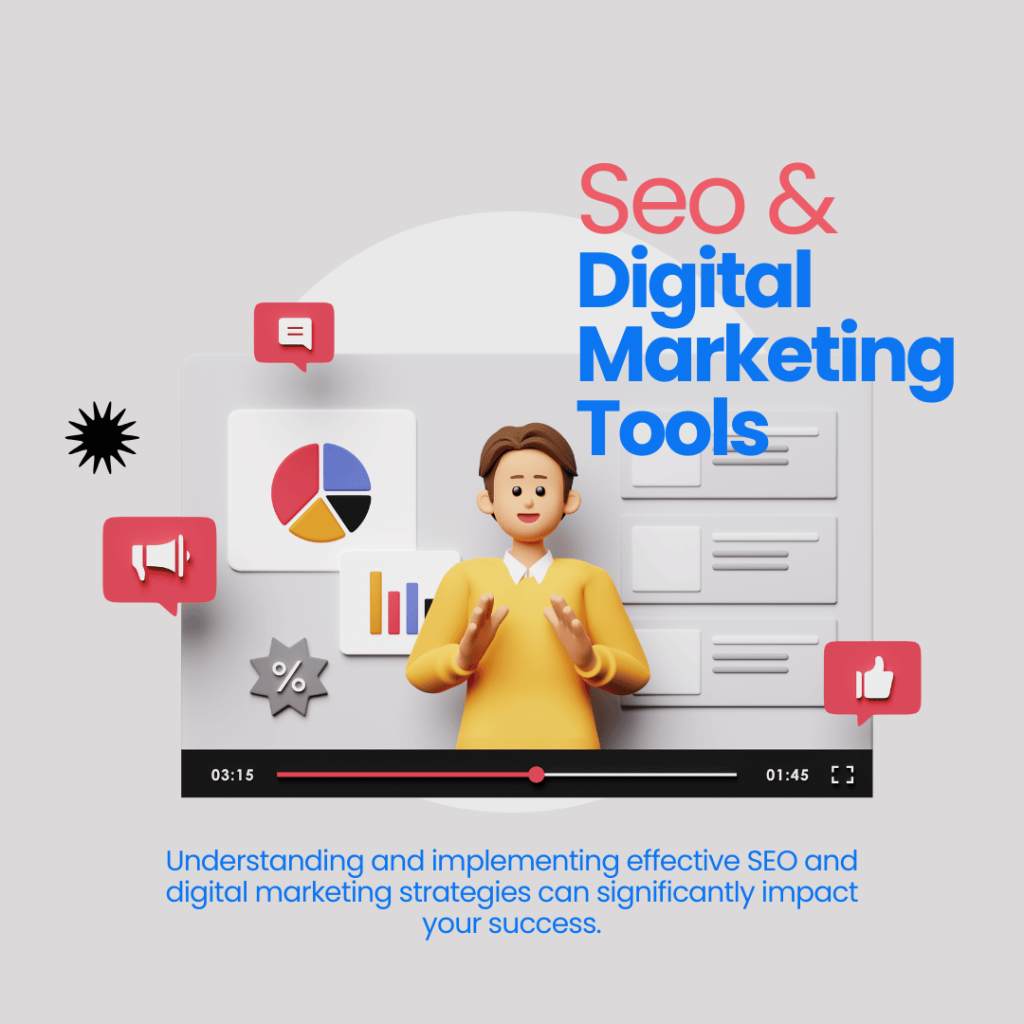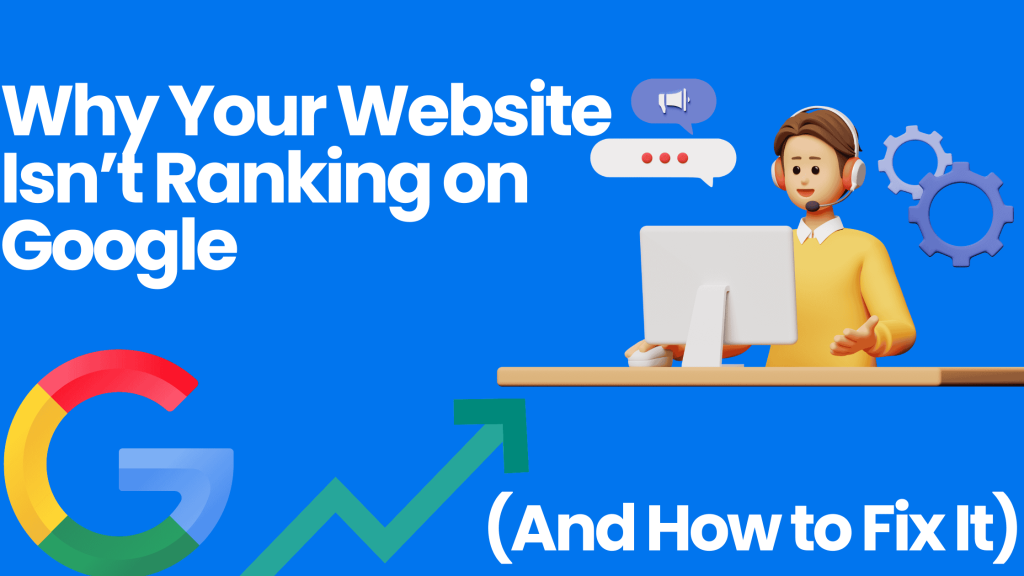Table of Contents
ToggleWhy Your Website Isn’t Ranking on Google (And How to Fix It)
If you’ve ever wondered, “Why is my website not ranking on Google?” you’re not alone. Many website owners face Google ranking issues, often due to common SEO mistakes that can be easily fixed. Whether you’re looking to fix low Google search rankings or learn how to improve website ranking on Google, this guide has you covered. In this blog post, we’ll dive into the reasons your website might not be ranking, provide actionable solutions, and highlight key website SEO mistakes to avoid. By the end, you’ll have a clear roadmap to improve your search engine visibility and drive more organic traffic to your site.
Why Is My Website Not Ranking on Google?
Why Is My Website Not Ranking on Google?
Understanding why your website isn’t ranking is the first step toward fixing the problem. Here are some common reasons:
Poor Keyword Optimization
One of the most common Google ranking issues is the lack of proper keyword optimization. If your content doesn’t align with what users are searching for, Google won’t rank it. For example, if you’re targeting the keyword “best coffee shops in New York,” but your content doesn’t include related terms like “top cafes in NYC” or “where to find great coffee in New York,” you’re missing out on valuable opportunities.
Low-Quality or Thin Content
Google prioritizes high-quality, informative, and engaging content. If your website has thin content (e.g., articles under 300 words, duplicate content, or poorly written posts), it won’t rank well. Focus on creating in-depth, valuable content that answers users’ queries.
Slow Website Speed
A slow-loading website is a major turnoff for both users and search engines. Google considers page speed as a ranking factor, so if your site takes more than 3 seconds to load, you’re likely losing rankings.
Lack of Backlinks
Backlinks are like votes of confidence from other websites. If your site has few or no backlinks, Google may not see it as authoritative or trustworthy. Building a strong backlink profile is essential for improving your rankings.
Technical SEO Errors
Technical SEO issues, such as broken links, improper redirects, or missing meta tags, can prevent your website from ranking. These errors make it difficult for search engines to crawl and index your site effectively.
Google Ranking Issues and Solutions
Now that we’ve identified the problems, let’s explore actionable solutions to fix them.
Conduct a Comprehensive SEO Audit
Start by performing a thorough SEO audit to identify issues like broken links, duplicate content, or missing meta descriptions. Tools like Google Search Console, SEMrush, or Ahrefs can help you pinpoint areas for improvement.
Optimize for the Right Keywords
Research and target keywords that align with your audience’s search intent. Use tools like Google Keyword Planner or Ubersuggest to find high-volume, low-competition keywords. Incorporate these keywords naturally into your titles, headings, and content.
Improve Website Speed
To boost your site’s speed, compress images, enable browser caching, and use a content delivery network (CDN). Tools like Google PageSpeed Insights can provide specific recommendations for improving load times.
Build High-Quality Backlinks
Focus on earning backlinks from reputable websites in your niche. You can do this by creating shareable content, guest blogging, or reaching out to influencers. Avoid spammy link-building tactics, as they can harm your rankings.
Fix Technical SEO Errors
Address technical issues like broken links, duplicate content, and improper redirects. Ensure your site has a clean URL structure, a sitemap, and proper use of header tags (H1, H2, H3).
Website SEO Mistakes to Avoid
Avoiding common SEO mistakes is just as important as implementing best practices. Here are some pitfalls to watch out for
Keyword Stuffing
Overloading your content with keywords can lead to penalties from Google. Instead, focus on natural, user-friendly language that incorporates keywords strategically.
Ignoring Mobile Optimization
With over 60% of web traffic coming from mobile devices, having a mobile-friendly website is crucial. Use responsive design to ensure your site looks great on all devices.
Neglecting Local SEO
If you run a local business, ignoring local SEO can hurt your rankings. Optimize your Google My Business profile, use location-based keywords, and encourage customer reviews.
Not Updating Content Regularly
Outdated content can harm your rankings. Regularly update your blog posts, product pages, and other content to keep it fresh and relevant.
Overlooking User Experience (UX)
Google prioritizes websites that offer a great user experience. Ensure your site is easy to navigate, visually appealing, and free of intrusive pop-ups.
How to Improve Website Ranking on Google
If you’re looking to fix low Google search rankings or improve website ranking on Google, here are some additional strategies
Create Long-Form, High-Quality Content
Long-form content (1,500+ words) tends to perform better in search rankings because it provides more value to users. Focus on creating comprehensive guides, tutorials, or case studies that address your audience’s needs.
Use Internal Linking
Internal linking helps search engines understand the structure of your website and distributes link equity throughout your site. Link to relevant pages within your content to improve navigation and SEO.
Leverage Social Media
While social media signals don’t directly impact rankings, they can drive traffic to your site and increase brand visibility. Share your content on platforms like Facebook, Twitter, and LinkedIn to reach a wider audience.
Monitor and Analyze Performance
Use tools like Google Analytics and Google Search Console to track your website’s performance. Monitor metrics like organic traffic, bounce rate, and keyword rankings to identify areas for improvement.
Stay Updated on SEO Trends
Google’s algorithms are constantly evolving, so it’s important to stay informed about the latest SEO trends and best practices. Follow reputable SEO blogs, attend webinars, and join online communities to keep your knowledge up to date.
Tools to Help You Fix Google Ranking Issues
Here are some tools to help you diagnose and fix your website’s ranking problems
- Google Search Console: Monitor your site’s performance and identify technical issues.
- Ahrefs: Analyze backlinks, keywords, and competitors.
- SEMrush: Conduct SEO audits and track rankings.
- Yoast SEO: Optimize on-page SEO elements like meta tags and readability.
- Google Analytics: Track user behavior and traffic sources.

Conclusion
If you’ve been asking, “Why is my website not ranking on Google?” the answer likely lies in one or more of the issues we’ve discussed. From poor keyword optimization to technical SEO errors, there are many factors that can impact your rankings. However, by conducting a thorough SEO audit, optimizing for the right keywords, and avoiding common website SEO mistakes, you can fix low Google search rankings and improve website ranking on Google.
Remember, SEO is an ongoing process. Regularly monitor your site’s performance, stay updated on algorithm changes, and continue refining your strategy. With patience and persistence, you’ll see your website climb the search engine rankings.
- How to Rank Your Business on Google Maps in the USA #1
World Capital of AI and Crypto USA: The Era of Innovation and Market Impact 2025
- How Digital Marketing Can Transform Small Businesses in the USA
- Common SEO Issues and Solutions USA
- India Based Digital Services for USA Clients
- Common Web Design Errors USA
- Mobile First Website Design




Hi my loved one! I want to say that this article is amazing, nice written and come with
approximately all important infos. I would like to peer more posts like this .
Thank You !
I’m very happy to uncover this page. I need to to thank you for ones time for this fantastic read!!
I definitely really liked every little bit of
it and i also have you saved to fav to look at
new things on your site.
Thank You